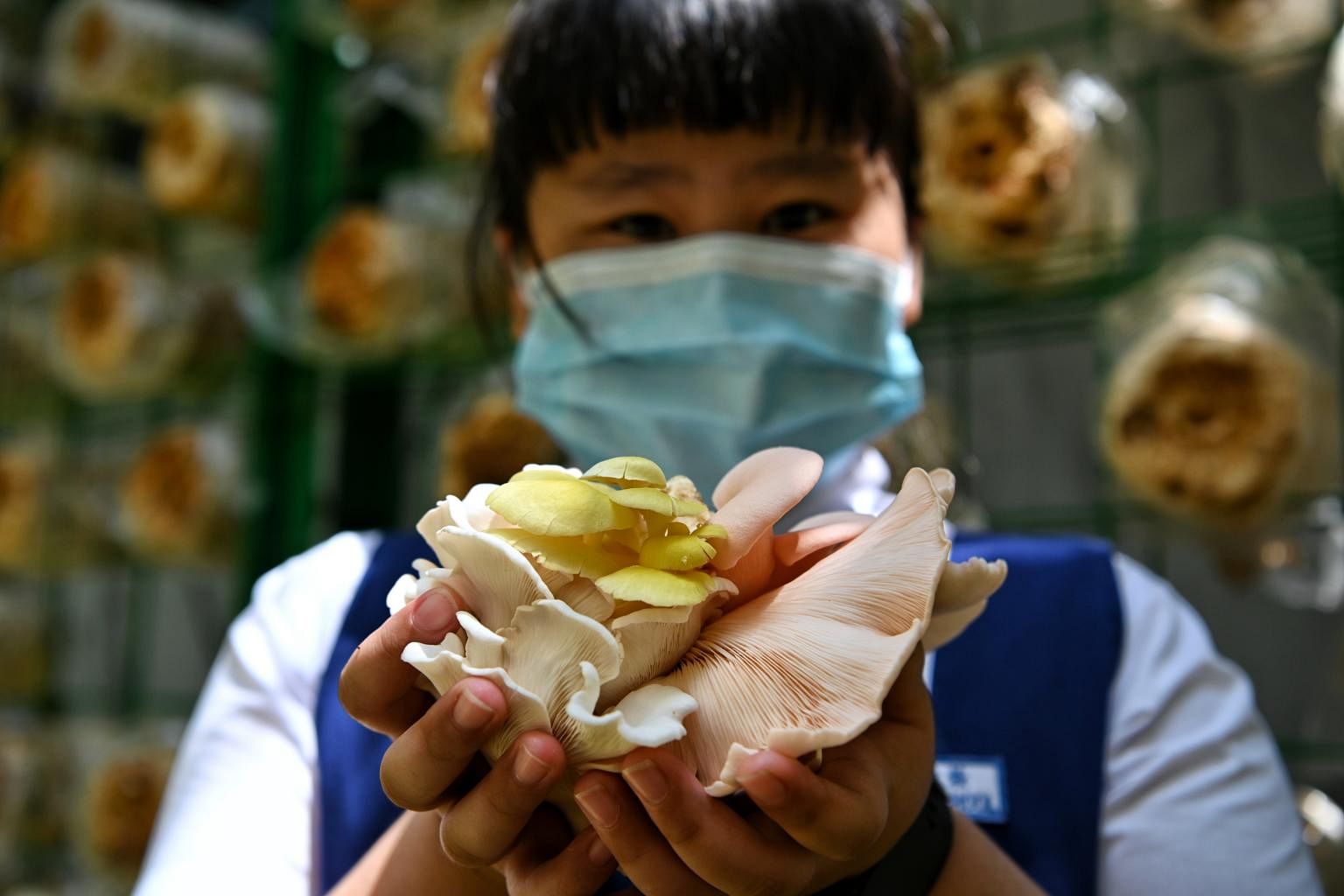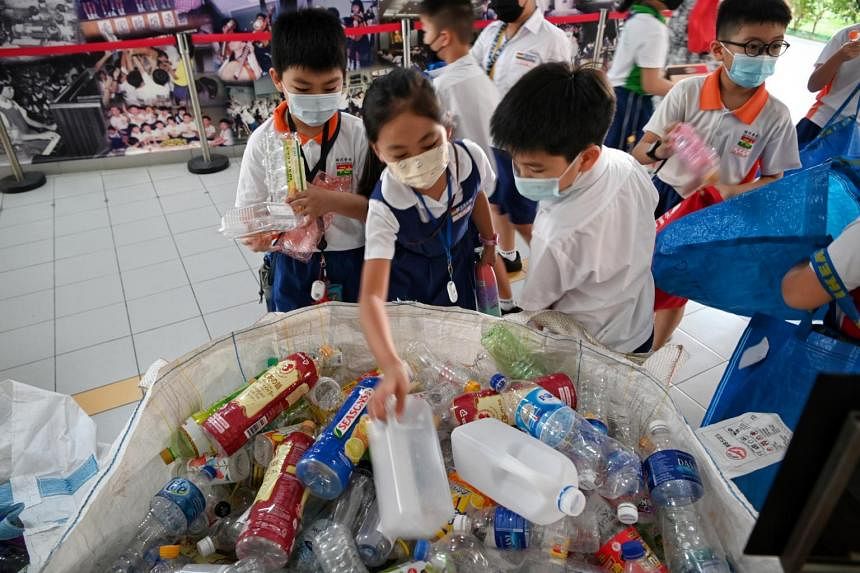SINGAPORE - After Pratibha Naidu, 16, learnt about environmental sustainability in school, she decided to make a conscious effort to reduce her carbon footprint.
One way she does this is by taking public transport instead of a taxi, even if it means more time spent on the journey.
She takes a bus from her home in Tampines when she goes for dental appointments to adjust her braces, for instance, even though her grandmother gives her money to take a taxi to the clinic in Outram.
"We have the freedom to make a change. Knowing that I'm making a change makes me happy," said the Secondary 4 student from Tampines Secondary School.
Her school is one of the four pilot schools in the Ministry of Education's Eco Stewardship Programme, which aims to nurture a culture of sustainable habits across all aspects of daily life in the next generation.
This is done in part through school-based initiatives and lesson packages to teach students about environmental sustainability.
For instance, the humanities, science, and character and citizenship education (CCE) curricula now include sustainability concepts.
The other three schools are Mee Toh School, Elias Park Primary School and Commonwealth Secondary School.
These schools have developed resources which either feature sustainability initiatives or are integrated with green infrastructure, such as solar panels and energy-efficient LED lights to reduce net carbon emissions.
Tampines Secondary, for instance, has installed energy-saving fans and used heat-reflective paint on east- and west-facing facade walls so that less energy is needed to cool down the building.
MOE plans to work towards reducing net carbon emissions from the schools sector by two-thirds come 2030, and aiming for at least 20 per cent of schools to be carbon-neutral by then.
Sustainability concepts in lessons, sorting out trash to build lifelong habits
In Tampines Secondary, environmental sustainability concepts are woven into the school curriculum.
For instance, in Secondary 1 science lessons, students learn about what Singapore is doing in the area of renewable energy and how solar energy is harnessed.
In food and consumer education, teachers talk about food waste in Singapore, and get students to think about how much food is thrown away and how much carbon footprint it involves.
Chemistry students learn about the harmful gases that are released into the environment as a result of human activities.
As part of CCE, Secondary 3 students delve into the topic of e-waste by discussing how the incineration of e-waste is toxic to humans. This is followed by an e-waste drive where the items collected can be upcycled or disposed of correctly.
Mrs Preeti Bhart Sheri, head of CCE at Tampines Secondary, said she hopes that the concepts reinforced over four years will help achieve a shift in mindset for these teenagers, who can then influence their family or neighbours.
Apart from the structured curriculum, students sort out the trash in their classrooms every day.
Two "green ambassadors" in each class are in charge of ensuring that the items that can be recycled are disposed of in the correct container and later brought to a common recycling bin.
Mrs Sheri, who teaches geography and social studies, said she hopes these daily practices will help youth form habits that will stay with them for life.
"I'm very heartened when I see them taking pride in separating their trash. All these habits will amount to something because it is not one-off - it is a routine."
She makes it a point to remind her students that individual efforts contribute to a cleaner and greener world.
"It is easy for us to think we are a small country or one individual, but we want them to learn that their individual eco-friendly habits do make a difference. Culture-building takes time," said Mrs Sheri.
The school also has an environment-related co-curricular activity, Maker Faire, where students upcycle discarded materials into usable products such as a foosball table or standing lamps.
"When they experiment with things, it gives them knowledge and skills to put into practice for an environmentally sustainable society. This may make them more passionate about future green jobs," said Mrs Sheri.
Activities that make environment education come alive
Environment education starts the moment a child enters Primary 1 in Mee Toh School.
Pupils at every level are involved in the school's weekly recycling programme, where they bring their recyclables from home every Wednesday.
A recycling station is set up in the school foyer, and two environment ambassadors in each class will take the recyclables there for sorting into different categories such as plastic, paper or aluminium drink cans.
As part of the school's applied learning programme in environment education, Primary 2 pupils learn about biodiversity and how to appreciate nature and the environment by making posters and doing presentations.
Through a farm-to-table programme in Primary 3, they learn about food security and learn firsthand about the hard work that goes into growing food.
They plant vegetables hydroponically and grow mushrooms, with half the harvest sold in the canteen and the other half donated to an old folks' home.

Not only does this programme integrate subjects like science, mathematics and social studies, but also pupils who experience the process of growing their own food become better advocates for less food wastage, said Miss Eleanor Quek, 35, who is the school's environment education adviser.
"We saw students appreciate food better because they eat what they grow in the canteen," said Miss Quek, who is also the subject head for total curriculum.
The school aims to walk its talk. So, as teachers teach Primary 4 pupils about water conservation, pupils see it come to life, as the school has its own rainwater collection tank where rainwater is collected and used to wash the school grounds.
Primary 6 pupil Dawn Tan, 12, said she has become more aware of environmental issues.
Dawn is the head of her school's "environment champions" - a group of about 50 student leaders from Primary 4 to Primary 6 who lead projects for environmental causes.
"We do projects like creating posters or decals, we encourage our peers to be more environmentally conscious or we make announcements to share facts about the environment," she said.

At home, Dawn's family has a recycling corner where items are sorted by their materials.
She said her mother had exposed her to simple recycling projects and that she has now learnt more from school to share with her mother.
"Once, I saw her about to throw away a plastic bottle and reminded her to reuse it two to three times before recycling, and not just throw it away," she said.
She is happy that her school is doing its part for the environment.
"I think it's a good thing we are training more people to be more environmentally friendly, and they will train more people. I hope that global warming will slow down through many efforts," she said.
How parents can play a part in supporting green efforts
Miss Eleanor Quek, Mee Toh School's environment education adviser, suggests starting with simple, small steps
- Reuse water used to wash vegetables and rice to water your plants.
- Take along your own containers to buy food.
- Recycle right: Clean plastic bottles before recycling and sort out recyclables.
"As long as you take the first step, the other, bigger steps are easier," she said.
Mrs Preeti Bhart Sheri, Tampines Secondary's head of character and citizenship education, reminds parents that micro habits, collectively, contribute to a greener Singapore
- For instance, do not buy a new mobile phone for the child when the old one is still usable, and do not encourage the child to take a taxi when public transport will do.
- Take kids for nature walks or plant something. The more kids are exposed to gardens or growing of vegetables, the more they will want to protect nature.
- Where possible, use fans instead of air-conditioning and keep the air-conditioner's temperature no colder than 25 deg C.
"Sometimes, people don't start because they think they must do something big. We want to say it's about that movement. A vegetarian meal once a week or once a month is a movement. It's more sustainable in the long run," said Mrs Sheri.



